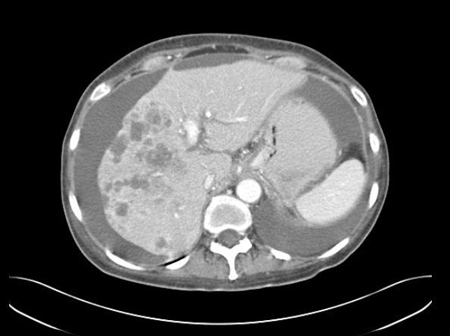Summary
Definition
History and exam
Key diagnostic factors
- pain (e.g., abdomen, chest, bone)
- family history of cancer
- constitutional symptoms
Other diagnostic factors
- jaundice
- symptoms of post-obstructive pneumonia
- haemoptysis
- ascites
- cervical chain adenopathy
- personal history of previous cancer
- history of smoking
- palpable mass
- neuropathic pain or weakness
- headaches
- seizures
- delirium
- history of heavy alcohol consumption
- hepatomegaly
Diagnostic investigations
1st investigations to order
- full blood count
- comprehensive metabolic panel
- CT chest/abdomen/pelvis
- MRI
- biopsy (pathological assessment)
- immunohistochemistry (IHC) tests
Investigations to consider
- fecal occult blood test
- lactate dehydrogenase
- urinalysis
- 18F-fluorodeoxyglucose-positron emission tomography (FDG-PET)/CT
- breast imaging (mammography, MRI, ultrasound)
- transvaginal ultrasound
- paracentesis
- endoscopy
- direct laryngoscopy with or without oesophagoscopy and bronchoscopy
- serum tumour markers
- genetic biomarker testing
Treatment algorithm
Contributors
Authors
Michael S. Lee, MD
Associate Professor
Department of Gastrointestinal Medical Oncology
Division of Cancer Medicine
University of Texas MD Anderson Cancer Center
Houston
TX
Disclosures
MSL has consulted for Pfizer, Bayer, Delcath, and Imvax. His institution has received research funding from Amgen, Exelixis, Bristol-Myers Squibb, Pfizer, Rafael Pharmaceuticals, EMD Serono, Genentech/Roche, Merck, Arcus, and Shanghai EpiMab Biotherapeutics. MSL is the author of a number of papers cited in this topic.
Acknowledgements
Dr Michael S. Lee would like to gratefully acknowledge Dr Ross C. Donehower, Dr David Cosgrove, and Dr Hatim Hussain, previous contributors to this topic.
Disclosures
RCD, DC, and HH declare that they have no competing interests.
Peer reviewers
Nikhil Khushalani, MD
Assistant Professor
Department of Medicine
Roswell Park Cancer Institute
Buffalo
NY
Disclosures
NK declares that he has no competing interests.
Zelig Tochner, MD
Associate Professor
Radiation Oncology
Children's Hospital of Philadelphia
Philadelphia
PA
Disclosures
ZT declares that he has no competing interests.
Justin Stebbing, MA, MRCP, MRCPath, PhD
Consultant Medical Oncologist/Senior Lecturer
Department of Medical Oncology
Imperial College/Imperial Healthcare NHS Trust
Charing Cross Hospital
London
UK
Disclosures
JS declares that he has no competing interests.
Peer reviewer acknowledgements
BMJ Best Practice topics are updated on a rolling basis in line with developments in evidence and guidance. The peer reviewers listed here have reviewed the content at least once during the history of the topic.
Disclosures
Peer reviewer affiliations and disclosures pertain to the time of the review.
References
Key articles
National Comprehensive Cancer Network. NCCN clinical practice guidelines in oncology: occult primary [internet publication].Full text
Krämer A, Bochtler T, Pauli C, et al. Cancer of unknown primary: ESMO clinical practice guideline for diagnosis, treatment and follow-up. Ann Oncol. 2023 Mar;34(3):228-46.Full text Abstract
National Institute for Health and Care Excellence. Metastatic malignant disease of unknown primary origin in adults: diagnosis and management. Apr 2023 [internet publication].Full text
Reference articles
A full list of sources referenced in this topic is available here.
Use of this content is subject to our disclaimer
